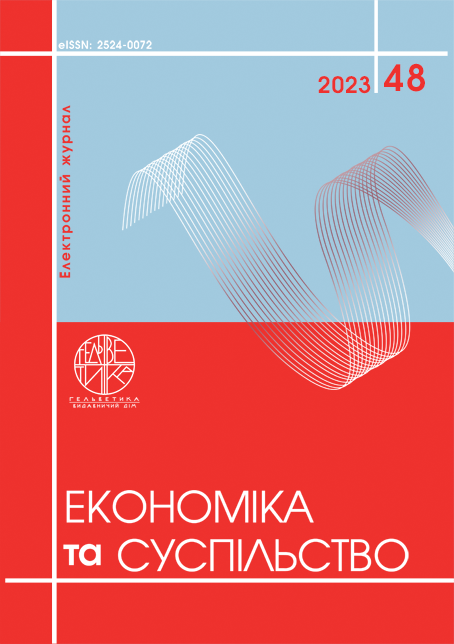НАПРЯМИ ОПТИМІЗАЦІЇ ВІРТУАЛЬНОГО КОМАНДНОГО МЕНЕДЖМЕНТУ В СУЧАСНОМУ БІЗНЕС-СЕРЕДОВИЩІ
Анотація
Останніми роками багатьом компаніям в Україні довелося пристосуватися до віртуального робочого середовища через кризу коронавірусу Covid-19 та військову агресію росії, що означає перехід до абсолютно нової форми управління командами. З невизначеним майбутнім попереду, дистанційна зайнятість може тривати досить довго, можливо, декілька наступних років. Мета полягає у дослідженні показників ефективної роботи віртуальних команд, основних проблем їх діяльності та розроблення рекомендаційних заходів менеджерам віртуальних команд, які можуть бути використані для вирішення виявленої потреби у вдосконаленні віртуального командного менеджменту. Виокремлено виклики командного менеджменту; систематизовано показники ефективної роботи віртуальних команд; виявлено основні потреби у вдосконаленні управління віртуальними командами; розроблено рекомендації щодо розв'язання проблем з організацією та управлінням роботою віртуальних команд.
Посилання
11 key indicators of good team performance. TrainingZone. URL: https://www.trainingzone.co.uk/develop/talent/11-key-indicators-of-good-team-performance
Carstens D. S., Richardson G., Smith R. B. Project Management Tools and Techniques. CRC Press, 2016. URL: https://doi.org/10.1201/b14740
Challenges & Solutions for Successfully Managing Virtual Teams. Symonds Research Training Course Materials. URL: https://symondsresearch.com/challenges-virtual-teams/
Clear T., MacDonell S. G. Understanding technology use in global virtual teams: Research methodologies and methods. Information and Software Technology. 2011. Т. 53, № 9. С. 994–1011.
Garro-Abarca V., Palos-Sanchez P., Aguayo-Camacho M. Virtual Teams in Times of Pandemic: Factors That Influence Performance. Frontiers in Psychology. 2021. Vol. 12. URL: https://doi.org/10.3389/fpsyg.2021.624637
Grenier R., Metes J. Going virtual: Moving your organization into the 21st century. Upper Saddle River, N.J: Prentice Hall PTR, 1995. 320 с.
Huang R., Kahai S., Jestice R. The contingent effects of leadership on team collaboration in virtual teams. Computers in Human Behavior. 2010. Т. 26, № 5. С. 1098–1110. URL: https://doi.org/10.1016/j.chb.2010.03.014
Piccoli G., Powell A., Ives B. Virtual teams: team control structure, work processes, and team effectiveness. Information Technology & People. 2004. Т. 17, № 4. С. 359–379. URL: https://doi.org/10.1108/09593840410570258
Purvanova R. K., Bono J. E. Transformational leadership in context: Face-to-face and virtual teams. The Leadership Quarterly. 2009. Т. 20, № 3. С. 343–357. URL: https://doi.org/10.1016/j.leaqua.2009.03.004
The Nine Belbin Team Roles. Belbin | High Performing Teams. URL: https://www.belbin.com/about/belbin-team-roles
Virtual organization: specifics of creation of personnel management system / J. Merkevičius et al. E+M Ekonomie a Management. 2015. Т. 18, № 4. С. 200–211. URL: https://doi.org/10.15240/tul/001/2015-4-014
Біла О. О. Організація сумісної діяльності у проектних командах. Вісник Черкаського університету. Серія «Педагогічні науки». Вип. 199. Ч. 1 2011. С. 243–246.
Волобоєва І., Кравчук О., Паращук Є. Універсальна модель компетентностей для роботи у дистанційному режимі. Економіка та суспільство. 2021. № 25. URL: https://doi.org/10.32782/2524-0072/2021-25-36
Доценко Н.В., Сабадош Л.Ю., Чумаченко І.В. Методи управління людськими ресурсами при формуванні команд мультипроектів та програм: монографія. Харків: ХНУМГ ім. О.М. Бекетова, 2015. 201с.
Кравчук О. І., Варіс І. О., Кир'янова О. В. Управління цифровими комунікаціями у віртуальних командах. Improving living standards in a globalized world: opportunities and challenges: Monograph / ред.: T. Nestorenko, T. Pokusa. Opole, 2021. С. 494–505. URL: https://www.wszia.opole.pl/wp-content/uploads/2020/05/2021_10_2.pdf.
Петюх В. М., Кравчук О. І. Управління командами: навч. посіб. К.: КНЕУ, 2012. 512 с.
Рудь Н., Мохнар М. Віртуальні підприємства: сутність та доцільність використання в інноваційній діяльності. Економічний форум. 2016. № 4. С.197-207. URL: http://nbuv.gov.ua/UJRN/ecfor_2016_4_30
11 key indicators of good team performance. (б. д.). TrainingZone. https://www.trainingzone.co.uk/develop/talent/11-key-indicators-of-good-team-performance
Carstens, D. S., Richardson, G., & Smith, R. B. (2016). Project management tools and techniques. CRC Press. https://doi.org/10.1201/b14740
Challenges & Solutions for Successfully Managing Virtual Teams. (б. д.). Symonds Research Training Course Materials. https://symondsresearch.com/challenges-virtual-teams/
Clear, T., & MacDonell, S. G. (2011). Understanding technology use in global virtual teams: Research methodologies and methods. Information and Software Technology, 53(9), 994–1011. https://doi.org/10.1016/j.infsof.2011.01.011
Garro-Abarca, V., Palos-Sanchez, P., & Aguayo-Camacho, M. (2021). Virtual teams in times of pandemic: Factors that influence performance. Frontiers in Psychology, 12. https://doi.org/10.3389/fpsyg.2021.624637
Grenier, R., & Metes, G. (1995). Going virtual: Moving your organization into the 21st century. Prentice Hall PTR.
Huang, R., Kahai, S., & Jestice, R. (2010). The contingent effects of leadership on team collaboration in virtual teams. Computers in Human Behavior, 26(5), 1098–1110. https://doi.org/10.1016/j.chb.2010.03.014
Piccoli, G., Powell, A., & Ives, B. (2004). Virtual teams: Team control structure, work processes, and team effectiveness. Information Technology & People, 17(4), 359–379. https://doi.org/10.1108/09593840410570258
Purvanova, R. K., & Bono, J. E. (2009). Transformational leadership in context: Face-to-face and virtual teams. The Leadership Quarterly, 20(3), 343–357. https://doi.org/10.1016/j.leaqua.2009.03.004
The Nine Belbin Team Roles. (б. д.). Belbin | High Performing Teams. https://www.belbin.com/about/belbin-team-roles
Merkevičius, J., Davidavičienė, V., Raudeliūnienė, J., & Buleca, J. (2015). Virtual organization: Specifics of creation of personnel management system. E+M Ekonomie a Management, 18(4), 200–211. https://doi.org/10.15240/tul/001/2015-4-014
12. Bila O.O. (2011). Organization of joint activities in project teams. Bulletin of the Cherkasy Bohdan Khmelnytsky National University. Series "Pedagogical Sciences", Vol. 199, Part 1, 243–246.
Voloboeva, I., Kravchuk, O., & Parschuk, Ye. (2021). A universal model of competencies for remote work. Economy and society, (25). https://doi.org/10.32782/2524-0072/2021-25-36
Dotsenko N.V., Sabadosh L.Yu., Chumachenko I.V. (2015). Methods of human resource management in the formation of multi-project and program teams: monograph. Kharkiv: XNUMX named after OHM. Beketova.
Kravchuk, O. I., Varis, I. O., & Kyrianova, O. V. (2021). Upravlinnia tsyfrovymy komunikatsiiamy u virtualnykh komandakh. In T. Nestorenko & T. Pokusa (Eds.), Improving living standards in a globalized world: Opportunities and challenges (pp. 494–505). The Academy of Management and Administration in Opole. https://www.wszia.opole.pl/wp-content/uploads/2020/05/2021_10_2.pdf
Petiukh, V., & Kravchuk, O. (2012). Upravlinnia komandamy. KNEU.
Rud N., Mokhnar M. (2016). Virtual enterprises: essence and expediency of use in innovative activity. Economic Forum, No 4, 197-207. http://nbuv.gov.ua/UJRN/ecfor_2016_4_30


